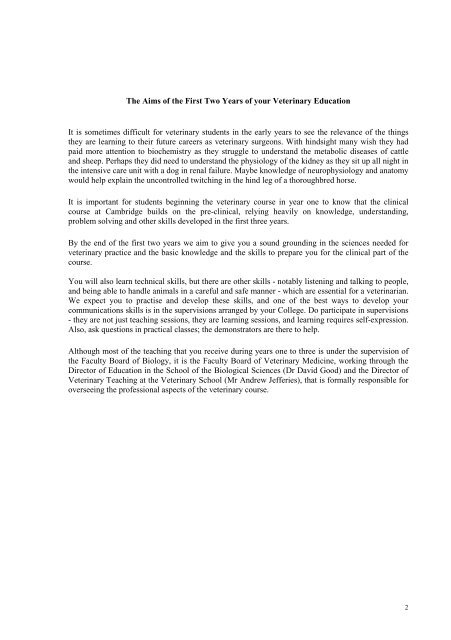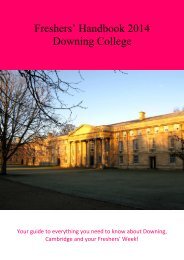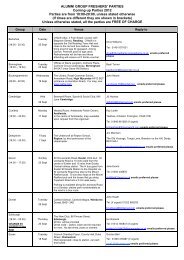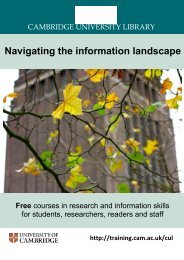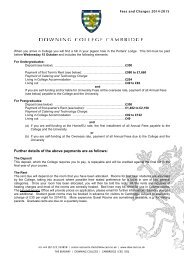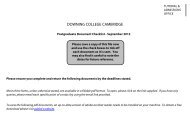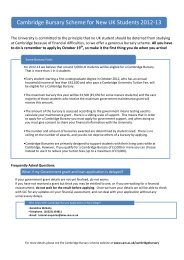veterinary students handbook the first two years - Downing College
veterinary students handbook the first two years - Downing College
veterinary students handbook the first two years - Downing College
Create successful ePaper yourself
Turn your PDF publications into a flip-book with our unique Google optimized e-Paper software.
The Aims of <strong>the</strong> First Two Years of your Veterinary Education<br />
It is sometimes difficult for <strong>veterinary</strong> <strong>students</strong> in <strong>the</strong> early <strong>years</strong> to see <strong>the</strong> relevance of <strong>the</strong> things<br />
<strong>the</strong>y are learning to <strong>the</strong>ir future careers as <strong>veterinary</strong> surgeons. With hindsight many wish <strong>the</strong>y had<br />
paid more attention to biochemistry as <strong>the</strong>y struggle to understand <strong>the</strong> metabolic diseases of cattle<br />
and sheep. Perhaps <strong>the</strong>y did need to understand <strong>the</strong> physiology of <strong>the</strong> kidney as <strong>the</strong>y sit up all night in<br />
<strong>the</strong> intensive care unit with a dog in renal failure. Maybe knowledge of neurophysiology and anatomy<br />
would help explain <strong>the</strong> uncontrolled twitching in <strong>the</strong> hind leg of a thoroughbred horse.<br />
It is important for <strong>students</strong> beginning <strong>the</strong> <strong>veterinary</strong> course in year one to know that <strong>the</strong> clinical<br />
course at Cambridge builds on <strong>the</strong> pre-clinical, relying heavily on knowledge, understanding,<br />
problem solving and o<strong>the</strong>r skills developed in <strong>the</strong> <strong>first</strong> three <strong>years</strong>.<br />
By <strong>the</strong> end of <strong>the</strong> <strong>first</strong> <strong>two</strong> <strong>years</strong> we aim to give you a sound grounding in <strong>the</strong> sciences needed for<br />
<strong>veterinary</strong> practice and <strong>the</strong> basic knowledge and <strong>the</strong> skills to prepare you for <strong>the</strong> clinical part of <strong>the</strong><br />
course.<br />
You will also learn technical skills, but <strong>the</strong>re are o<strong>the</strong>r skills - notably listening and talking to people,<br />
and being able to handle animals in a careful and safe manner - which are essential for a veterinarian.<br />
We expect you to practise and develop <strong>the</strong>se skills, and one of <strong>the</strong> best ways to develop your<br />
communications skills is in <strong>the</strong> supervisions arranged by your <strong>College</strong>. Do participate in supervisions<br />
- <strong>the</strong>y are not just teaching sessions, <strong>the</strong>y are learning sessions, and learning requires self-expression.<br />
Also, ask questions in practical classes; <strong>the</strong> demonstrators are <strong>the</strong>re to help.<br />
Although most of <strong>the</strong> teaching that you receive during <strong>years</strong> one to three is under <strong>the</strong> supervision of<br />
<strong>the</strong> Faculty Board of Biology, it is <strong>the</strong> Faculty Board of Veterinary Medicine, working through <strong>the</strong><br />
Director of Education in <strong>the</strong> School of <strong>the</strong> Biological Sciences (Dr David Good) and <strong>the</strong> Director of<br />
Veterinary Teaching at <strong>the</strong> Veterinary School (Mr Andrew Jefferies), that is formally responsible for<br />
overseeing <strong>the</strong> professional aspects of <strong>the</strong> <strong>veterinary</strong> course.<br />
2


